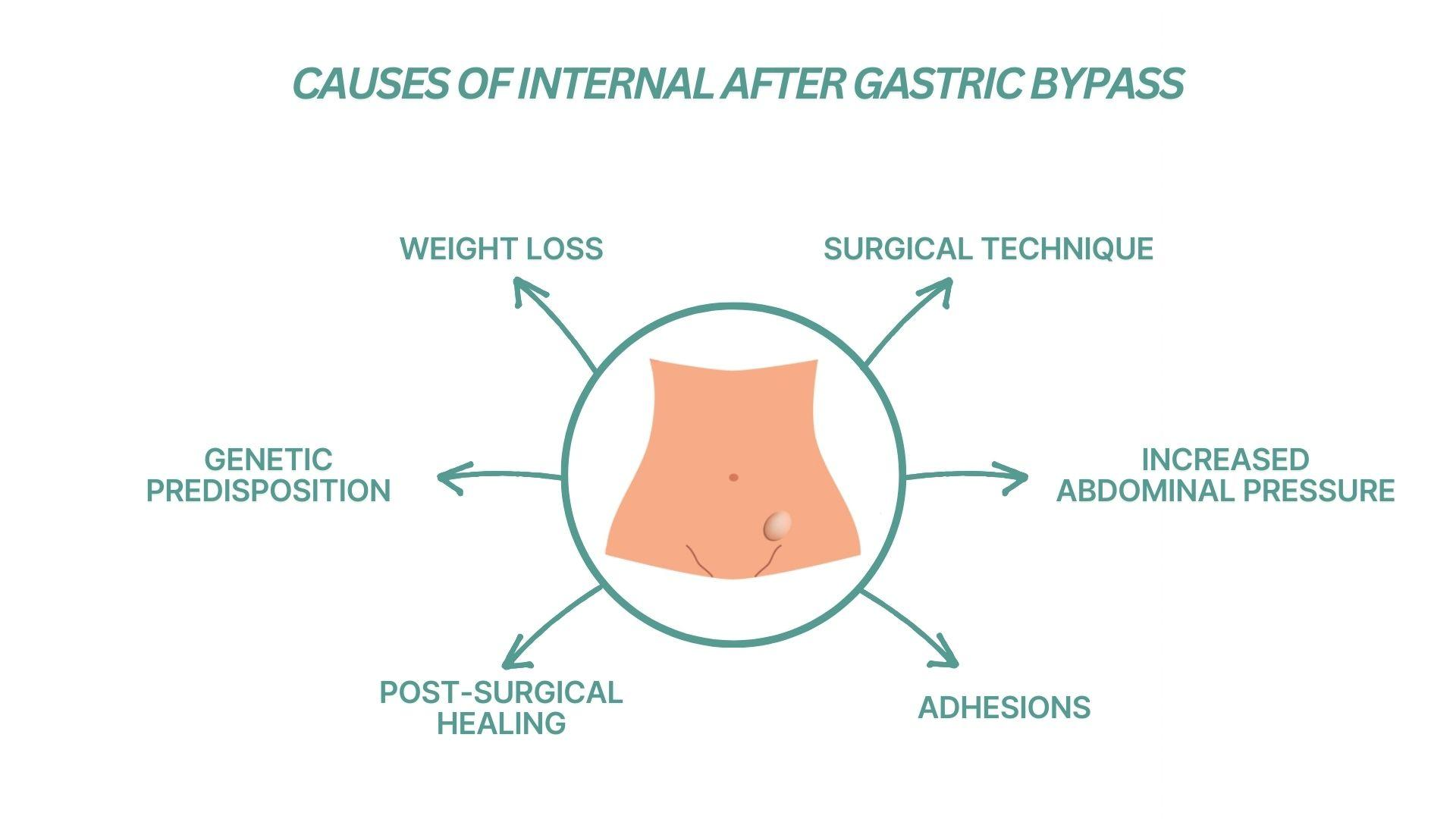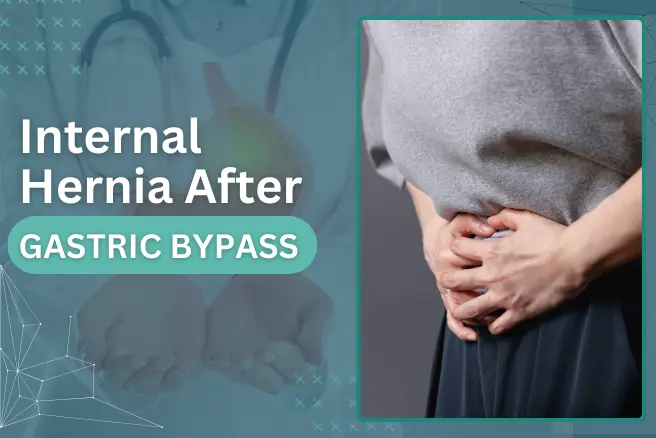Gastric bypass surgery is a popular weight loss procedure. It has helped many achieve significant weight reduction. However, like any major surgery, it comes with potential complications. One such complication is an internal hernia. Internal Hernia After Gastric Bypass can cause severe abdominal pain and other symptoms. Understanding this condition is crucial for those who have undergone or are considering gastric bypass surgery. As is usual, prevention is better than cure, however, with weight loss, the stitches taken to prevent internal hernias may give way leading to their development in <1% of patients undergoing gastric bypass surgery.
Dr. Harsh Sheth is a Bariatric & GI Laparoscopic Surgeon in Mumbai. He has been at the forefront of treating complications associated with bariatric surgery. His extensive experience and expertise in this field have made him one of the best bariatric surgeon in Mumbai, providing top-notch care to his patients.
Experiencing unusual symptoms after gastric bypass? Book an appointment with an expert to get the care you need.
Ever wondered how common internal hernias are after gastric bypass surgery? Let’s find out!
Is Internal Hernia After Gastric Bypass Common?

Internal hernias are relatively rare. However, significant complications can occur after gastric bypass surgery. They happen when a portion of the intestine protrudes through a weakness or gap between the bypassed intestines. This can lead to severe complications if not addressed promptly. According to Dr. Harsh Sheth, early diagnosis and treatment are crucial to avoid severe outcomes.
In his extensive years of career, Dr. Sheth has observed that while the incidence rate is low (<1%), the impact on patients can be considerable. Symptoms often include abdominal pain, nausea, and vomiting, which can escalate quickly. Therefore, patients who have undergone bariatric surgery should be vigilant about any unusual symptoms. Also, it is crucial to seek immediate medical attention if they suspect an internal hernia.
Concerned about post-surgery complications? Consult with an expert bariatric surgeon to ensure your health and safety.
What are the different types of internal hernias after gastric bypass? Let’s delve into it!
Types of Internal Hernia After Gastric Bypass
Here are the types of internal hernia after gastric bypass explained in one line each:
- Transmesocolic Hernia: Occurs through the mesocolon, the membrane attaching the colon to the abdominal wall.
- Peterson’s Hernia: Involves herniation through the space behind the Roux limb mesentery.
- Jejunojejunostomy Mesenteric Hernia: Develops at the site where the jejunum is connected in a Roux-en-Y gastric bypass.
- Transverse Mesocolon Hernia: Arises through a defect in the transverse mesocolon.
- Gastrojejunal Anastomotic Hernia: Forms near the anastomosis between the stomach pouch and the jejunum.
Not sure about the types of hernias you might be at risk for? Schedule a consultation with a bariatric expert today.
Wondering what causes these internal hernias after gastric bypass? Here’s what you need to know!
What Causes Internal Hernia After Gastric Bypass

Understanding the causes of internal hernias can help in their prevention and early detection. Here are some common causes:
- Weight Loss:Rapid weight loss can lead to changes in the abdominal cavity, increasing hernia risk.
- Surgical Technique:The specific technique used during surgery can influence the likelihood of hernia formation.
- Post-Surgical Healing:Poor healing or complications during recovery can create weak spots in the abdominal wall.
- Increased Abdominal Pressure:Activities that significantly increase abdominal pressure, such as heavy lifting, can contribute.
- Genetic Predisposition:Some individuals may be more prone to hernias due to genetic factors.
Adhesions: Scar tissue from previous surgeries can create areas of weakness.
Curious about how these factors affect you? Consult with a professional bariatric surgeon to learn more about prevention.
Do you know the symptoms to watch out for after gastric bypass? Let’s explore!
Symptoms of Internal Hernia After Gastric Bypass
Recognizing the internal hernia after gastric bypass symptoms early can be lifesaving. Here are some common symptoms of internal hernia after gastric bypass include:
- Abdominal Pain: Severe and intermittent pain, often in the upper or middle abdomen.
- Nausea and Vomiting: Frequent nausea and vomiting, which may lead to dehydration.
- Bloating: Sensation of fullness and abdominal distension.
- Altered Bowel Movements: Changes in bowel habits, including constipation or diarrhea.
- Inability to Pass Gas: Difficulty or inability to pass gas, indicating a possible bowel obstruction.
- Tenderness in Abdomen: Pain when pressing on the abdomen.
- Symptoms Worsening After Eating: Symptoms often exacerbate after meals.
Experiencing any of these symptoms? Book an appointment with an expert immediately.
Wondering how to prevent these hernias after surgery? Here’s what you should know!
How Can You Prevent an Internal Hernia After Gastric Bypass
To prevent an internal hernia after gastric bypass, consider the following measures:
- Surgical Technique: Ensure proper surgical technique by experienced bariatric surgeons. This includes careful closure of mesenteric defects during the initial surgery, hence following the adage, prevention is better than cure.
- Regular Follow-Ups: Schedule regular follow-up appointments with your surgeon to watch for any signs of complications.
- Prompt Management of Symptoms: Seek immediate medical attention if experiencing symptoms. This includes severe abdominal pain, nausea, or vomiting.
- Adherence to Post-Surgery Guidelines: Follow dietary and activity guidelines provided by your healthcare team to reduce the risk of complications.
- Weight Management: Maintain a healthy weight post-surgery to reduce strain on the abdominal structures.
Conclusion
Internal hernias after gastric bypass surgery, while rare, are serious complications. It requires prompt attention. Patients should be aware of the risks, symptoms, and preventive measures to ensure their well-being.
Dr. Harsh Sheth, a Bariatric & GI Laparoscopic Surgeon in Mumbai, brings over a decade of experience in managing these conditions. He provides professional Bariatric Surgery in Mumbai. By staying informed and proactive, patients can better navigate their post-surgery journey and maintain their health.
FAQs:
What is the recovery time for gastric bypass surgery with hernia repair?
The recovery time for gastric bypass surgery with hernia repair typically ranges from 4 to 6 weeks, depending on individual healing rates and adherence to post-operative care.
Can an internal hernia after gastric bypass resolve on its own?
No, an internal hernia after gastric bypass surgery usually requires surgical intervention and does not resolve on its own.
Are there any long-term complications associated with internal hernias after gastric bypass?
Yes, long-term complications of internal hernias after gastric bypass can include bowel obstruction, chronic abdominal pain, and potentially life-threatening strangulation of the intestines.
Can a bariatric surgeon repair a hernia?
Yes, a bariatric surgeon is qualified to repair hernias, especially those that occur as a complication of weight loss surgery. In fact, one must approach a certified bariatric surgeon only for repair of internal hernia’s as they can manage it in the best possible manner.

